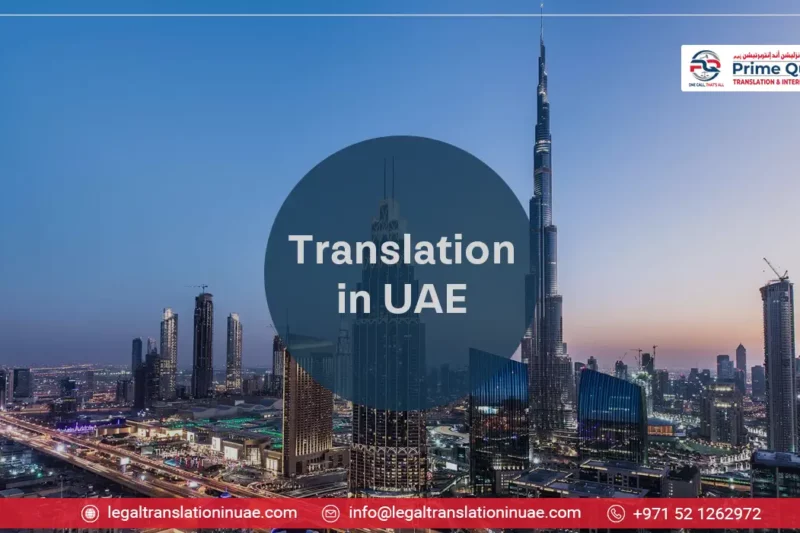
Welcome to our blog post on the power of translation in Dubai law! Did you know that a single word or phrase can make all the difference in a legal case? In a diverse city like Dubai, where multiple languages are spoken, the accuracy and effectiveness of translations are crucial. This is where Prime Quality Translation, plays a pivotal role.
In this post, we will explore the role of translation and how it can make or break your case. So, let's dive in and discover the impact of translation on the legal landscape of Dubai!
Role of Translation in Dubai Ensuring Legal Clarity
In Dubai's multilingual legal environment, translation is crucial in maintaining clarity. Accurate translation in Dubai ensures that laws and legal documents are understood as intended, regardless of the language in which they were initially written.
It bridges linguistic gaps, allowing all parties involved in legal proceedings to understand their rights and obligations fully. This clarity is crucial in achieving just outcomes in legal cases.
Power of Translation in Dubai Law
Translation has a great deal of significance in Dubai law. A precise, accurate translation can differentiate between a fair judgment and a misjudged case. It ensures that all parties have equal access to justice regardless of their language.
On the other hand, a good translation can distort the essence of laws and lead to favorable outcomes. Hence, accurate, contextually appropriate translation must be balanced in a multicultural city like Dubai.
Translation in Judicial Proceedings
In the courts of Dubai, translation plays a critical role in ensuring equal access to justice. An extensive examination of the function of translation in court proceedings highlights how essential it is, from completing legal requirements to fostering communication.
Contracts and Agreements: Translating Legal Documents
Translating contracts and agreements is crucial for precision in legal communication, especially in international business hubs like Dubai. Navigating complex legal language requires a nuanced approach to maintain clarity and integrity across languages.
Ensuring Legal Equality: Translation in Legal Rights and Responsibilities
Translation is pivotal in ensuring legal equality by bridging language barriers. It empowers individuals, regardless of their linguistic background, to comprehend their rights and responsibilities accurately, fostering equal access to justice. In the diverse legal landscape, precise translation becomes a cornerstone for fairness and equality before the law.
The Benefits of Working with Prime Quality Translation
When you choose Prime Quality Translation, you select a service that holds itself to the highest standards. With our team of qualified translators, we ensure meticulous attention to detail, capturing every nuance in your legal documents. We're not just focused on words but on delivering precise and culturally relevant translations.
Our commitment to quality can make a crucial difference in your legal proceedings, ensuring your case is presented accurately and understood clearly, regardless of language barriers. With us, you can be confident that every translation is in the hands of experts.
Trusted Partner of Translation in Dubai
As your trusted translation partner in Dubai, we provide precision, reliability, and cultural sensitivity. Our expert team navigates legal and business complexities with a deep understanding of local nuances, ensuring effective and precise translations for a diverse and dynamic Dubai.
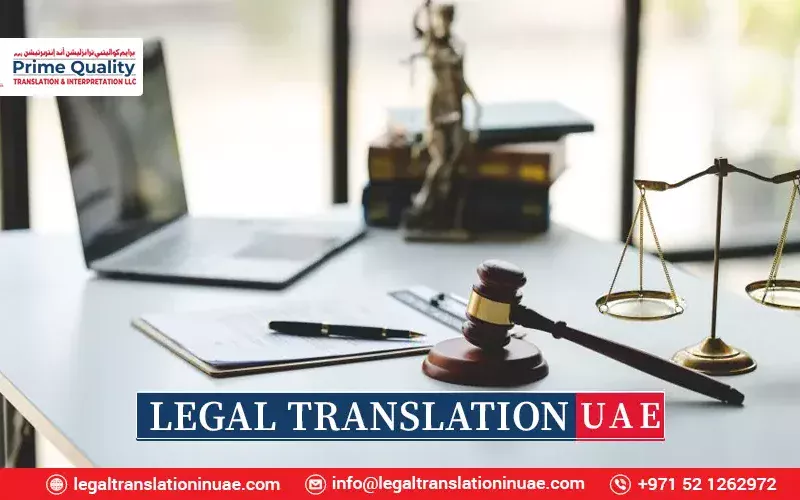
Are you in need of top-notch legal translation services in Dubai? Look no further than Prime Quality Translation! With years of experience and a team of highly qualified translators, we are dedicated to providing accurate and reliable translations for all your legal documents. Our commitment to quality and customer satisfaction sets us apart from other translation companies in Dubai.
Trust us to handle all your translation needs and experience the best service in the UAE. Keep reading to learn more about our services and how we can help you with your translation requirements.
Importance of Legal and Accurate Translation
In Dubai's multicultural landscape, translation services are crucial for bridging language and legal gaps and ensuring clarity in contractual agreements, court proceedings, and legal documentation.
Regarding legal translation services in Dubai, precision, expertise, and an in-depth understanding of both language and law are critical. That's why trusting professionals like Prime Quality with your certified translation needs is essential.
Expertise of Prime Quality in Legal Translation
Here are some best expertise below:
1. Comprehensive Legal Translation Solutions
We offer extensive legal and accurate translation solutions catering to diverse legal fields. Whether you need translation for contracts, legal briefs, court documents, or corporate law documents, our team is up to the task. Our vast industry experience allows us to tailor our services to meet your needs, ensuring you get the most precise and relevant legal translations in Dubai.
2. Quality Assurance and Accuracy in Legal Translations
We ensure impeccable translation in Dubai through a rigorous quality control process. Our expert linguists and legal professionals meticulously proofread and verify each document to eliminate errors and guarantee accuracy.
3. Specialized Legal Document Translation
We stand out with our specialized legal document translation services. We handle diverse documents, including:
- Patent Applications
- Litigation Documents
- Merger
- Acquisition Agreements and More
Our technical translators have the requisite expertise in different branches of law, enabling them to translate legal documents with precision and accuracy. Trust us for a detailed, comprehensive, and error-free translation of your complex legal documents.
4. Industry Leader
As a legal translation industry leader, we set the standard for excellence, known for professionalism and unwavering quality. Our vast industry knowledge and unwavering dedication to customer satisfaction have placed us at the forefront of our field.
We're not just a translation company; we are a trusted partner to countless businesses navigating the complex legal landscapes in Dubai and beyond.
5. Confidentiality and Data Security Measures
We prioritize the security and confidentiality of your legal documents. We implement strict data protection measures and follow stringent confidentiality protocols.
All our team members are bound by non-disclosure agreements, ensuring your sensitive information stays secure. Trust us to treat your legal documents with the utmost respect for privacy and confidentiality.
Contact Information and Customer Support
Should you need certified translation services in UAE, don't hesitate to contact us. Our customer support team can answer any inquiries and provide tailored solutions. Contact us at Email info@legaltranslationinuae.com Phone Number 97144396274 or visit our website.
Your satisfaction is our first priority, and we look forward to serving you. Trust us, your go-to partner for all your translation needs in Dubai.

Welcome to our blog! As businesses expand globally, ensuring that all legal documents and contracts are accurately translated has become increasingly important. This is where Prime Quality comes in, providing expert Legal Translation Dubai services to safeguard your international business deals.
With our team of experienced translators who are well-versed in legal terminology and cultural nuances, we guarantee accurate and reliable translations that will help you confidently navigate the complexities of cross-border transactions.
Keep reading to learn more about the importance of legal translation in international business and how we can support your company's growth and success.
Importance of Legal Translation for Worldwide Business
In the global business arena, Legal Translation Dubai is paramount. It facilitates clear, legally sound communication in cross-border transactions. Misinterpretation or inaccurate translation of legal jargon can result in severe consequences, including:
- Legal Disputes
- Monetary Losses
International businesses can reduce potential legal risks by using our services, ensuring smooth, trouble-free business operations. Our translation in Dubai is crucial for successfully executing international business deals.
Key Features and Capabilities of Prime Quality
Here many key features are below:
1. Ensuring Accuracy and Precision in Legal Translations
At Prime Quality, we prioritize precision in legal translations. Our meticulous approach ensures accurate representation, preserving the integrity of your original documents. Our linguistically skilled and legally proficient translators guarantee precise translations, facilitating effective business operations in foreign markets. Trust us to convey the true essence of your legal documents for seamless international business.
2. Bridging Cultural and Linguistic Gaps in Business Deals
Experience accurate and culturally sensitive translations with us. Our skilled translators bridge linguistic and cultural gaps to prevent miscommunication. We prioritize preserving context, enabling effective cross-border communication of your business intentions and strategies.
3. Compliance with Local and International Legal Standards
We ensure precise compliance with both local and global legal standards. Our dedicated team stays updated on the latest legal developments worldwide, safeguarding your company's reputation and preventing legal complications in international operations. Trust us to expertly navigate the complexities of international law on your behalf.
4. Enhancing Business Communication and Understanding
We facilitate effective communication in business deals by translating legal documents into stakeholders' native languages. We ensure mutual understanding, fosters trust and set the stage for successful international collaborations.
5. Ensuring Confidentiality and Security in Legal and Accurate Translation Processes
We prioritize your confidentiality and security. Our strict data protection protocols ensure discreet handling of your legal documents. Our secure translation platform prevents unauthorized access, guaranteeing the confidentiality of your business secrets throughout the translation process.
How Prime Quality Safeguards Your Worldwide Business Interests
Prime Quality, your trusted partner for legal translation services in Dubai, minimizes risks and legal disputes with accurate, culturally sensitive, and compliant translations. Our commitment to confidentiality ensures secure handling of your international business matters, ensuring smooth cross-border operations for global success.
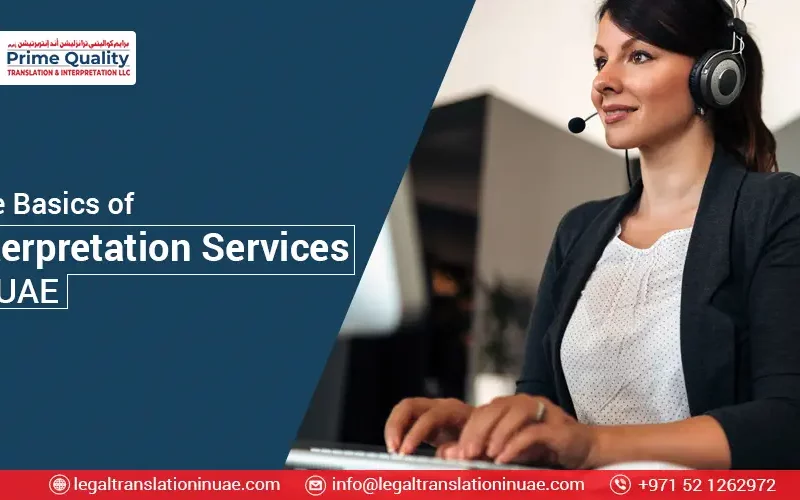
Welcome to our blog, where we strive to make communication simple and accessible for everyone. In today's globalized world, language barriers can often hinder effective communication, especially in a diverse city like Dubai. That's where Prime Quality Translation & Interpretation comes in, we provide top-notch services in Dubai.
We understand the importance of clear and accurate communication, which is why we are dedicated to bridging the gap between languages and cultures. Join us as we explore the world of interpretation services in Dubai and how we can make communication simpler for you.
The Growing Demand for Interpretation Services
The need for interpretation services has increased significantly over the past few years as Dubai gains popularity as a global hub for business. Professional interpreters in Dubai play a crucial role in bridging language gaps and ensuring clear communication in conferences, meetings, and tourism. This heightened demand reflects Dubai's multicultural dynamism and global aspirations.
Types of Interpretation Services
Various interpreting services are available to cater to different needs.
1. Simultaneous Interpretation
- Occurs in real-time while the speaker is talking.
- Interpreters listen and translate simultaneously.
- Commonly used in conferences, meetings, and large events.
2. Consecutive Interpretation
- Involves pausing so that the message may be understood by the interpreter.
- The speaker speaks in segments, allowing time for interpretation.
- Commonly used in smaller meetings, negotiations, and interviews.
3. Escort or Liaison Interpretation
- The interpreter accompanies a person or a small group.
- Facilitates communication in informal settings.
- Commonly used in business trips, site visits, or social events.
4. Whispered Interpretation (Chuchotage)
- Similar to simultaneous interpretation but in a whisper.
- Perfect in circumstances when just a small number of people require interpreting.
- Suitable for small groups or one-on-one settings.
5. Remote Interpretation
- Remote interpretation service over the phone.
- Useful for spontaneous or urgent situations.
- Commonly used in customer service, healthcare, and legal contexts.
6. Sign Language Interpretation
- Consists of converting spoken words into sign language.
- Vital for the Deaf and hard-of-hearing community.
- Used in various settings, including conferences, education, and public services.
The Role of Professional Interpreters in Facilitating Communication
Professional interpreters in Dubai are critical in facilitating efficient and effective communication. With their expertise in languages and cultures, they break down barriers, transforming complex messages into understandable content.
They uphold precision and cultural sensitivity, ensuring the original message is conveyed accurately and maintaining the intent, tone, and context. Additionally, they adhere to confidentiality principles, fostering trust and confidentiality in business interactions.
Key Industries Benefiting from Interpreting Services
Interpreting services are essential across key industries like:
- International Business
- Healthcare
- Legal
- Tourism
Skilled interpreters facilitate effective communication, ensuring accuracy in critical information exchange and enhancing cross-cultural engagements.
Choosing the Right Interpretation Service Provider
When choosing an interpreting service provider in Dubai, consider their range of services, languages covered, and cultural understanding. Look for a provider with a robust team of certified interpreters and a proven track record of successful assignments.
Confidentiality should be a priority to ensure sensitive information is handled appropriately. Lastly, opt for a provider who offers tailored solutions to your needs and employs interpreters who understand language and the nuances of cultural communication.
Overall choose Prime Quality for all interpretation services because we are known for our top-notch interpreters, diverse service offerings, and strong cultural sensitivity.
The Impact of Interpretation Services on Business Growth
Interpretation services in Dubai significantly contribute to business growth. They enable businesses to cross linguistic and cultural barriers, opening doors to global markets. They help establish clear communication and build strong relationships with international partners and clients.
This facilitates better understanding and collaboration, driving business success. Thus, interpreters in Dubai play a vital role in fostering global business expansions and economic growth.
Interpretation Services with Prime Quality Translation: Communication Made Simple
At Prime Quality, we pride ourselves on simplifying communication in Dubai with top-notch interpreting services. We offer various benefits for multiple scenarios, from simultaneous to consecutive interpretation. Our team of certified interpreters is dedicated to breaking down language barriers with precision and cultural sensitivity.
Equipped with a deep understanding of diverse cultures, we deliver accurate translations, fostering transparent and effective communication. Trust us to make your cross-cultural interactions in Dubai seamless.
Trusted Partner
As your trusted partner, Prime Quality is committed to enhancing your communication experiences in Dubai. We adhere to the strictest guidelines for accuracy, confidentiality, and professionalism. Our exceptional interpreters are skilled in navigating the intricacies of language and culture, ensuring your messages are conveyed as intended.
From individual needs to large-scale corporate interactions, we are your go-to partner for interpretation services in Dubai. Please choose us and make communication challenges a thing of the past.
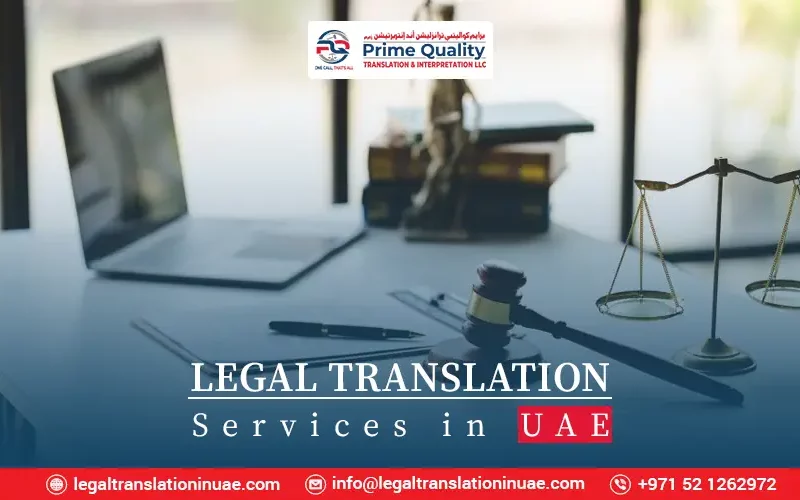
Are you in need of accurate and reliable legal translation services in Dubai? Look no further than Prime Quality Translation! We specialize in precise legal translations, ensuring accuracy and confidentiality.
Our experienced team delivers top-notch services for a range of legal documents, from contracts to court papers. Choose us for the best translation services in UAE. Read on to discover more about our exceptional offerings.
Explore the Importance of Legal Translations
Legal translations are of utmost importance in today's globalized world. Even one translation error might have significant effects, such as:
- Leading to Misunderstandings
- Disputes
- Even Legal Problems
Whether you are a law firm, a corporate entity, or an individual, ensuring the accuracy of legal translations is crucial for effective communication and compliance with legal requirements. With Prime Quality, you can trust that your legal documents will be translated with precision and attention to detail, giving you peace of mind and confidence in the accuracy of your translated materials.
Why Choose Prime Quality for Legal Translation Services?
Here are some factors why you choose Prime Quality for translation services.
1. Expert Translators
Our team consists of experienced translators with a deep understanding of legal terminology and procedures.
2. Precision and Accuracy
We prioritize precision and accuracy, ensuring that your legal documents are translated with the utmost attention to detail.
3. Comprehensive Solutions
Beyond translation, we offer additional services such as document review, formatting, and consultation to meet all your translation needs.
4. Compliance with Standards
We adhere to both local and international legal standards, guaranteeing that your translations align with the requirements of the target country.
5. Confidentiality
Your document's security is our priority. We follow strict protocols and use secure systems to maintain the confidentiality of your legal documents.
6. Superior Customer Service
Our dedicated team is committed to providing exceptional customer service, ensuring a seamless and positive experience for our clients.
7. Simplicity and Accuracy
We simplify the translation process, focusing on accuracy and clarity to deliver reliable and efficient legal translations.
Services Offered by Prime Quality: More Than Just Translation
We offer a wide range of services that go beyond just translation.
- Document Translation
- Certified Translation
- Legal Translation
- Driving License Translation
- Immigration Translation
- Medical Translation
- Marriage Certificate Translation
- Website Localization
- Interpretation Services
- All Kind of Language Translation
Our team of experts is dedicated to providing comprehensive solutions to meet your legal translation needs in Dubai. We aim to provide you with a complete service package that solves your legal documents and enhances them to meet the highest standards. Trust us for all your legal translation services in Dubai requirements and experience the difference.
Ensuring Legal Precision: Adherence to Local and International Standards
We adhere to both local and international legal standards, guaranteeing that your translations align with the requirements of the target country. We understand the importance of accuracy and precision when translating legal documents and strive to meet the highest standards in every translation we deliver.
Our team of experienced professionals is well-versed in the legal requirements of different jurisdictions, allowing us to provide you with legally valid translations that meet all necessary standards. With us, you can have peace of mind knowing that your translated materials will comply with local and international legal requirements.
Prime Quality Commitment to Confidentiality
We understand the importance of confidentiality regarding legal translations. That's why we prioritize it as a top priority in our services. You can trust that your sensitive legal documents will be handled with the utmost care and discretion.
Our team of professionals is committed to maintaining strict confidentiality throughout the translation process, ensuring that your information remains secure and protected. With us, you can have peace of mind knowing that your confidentiality is our priority. Trust us for all your translation needs in Dubai.
Our Superior Customer Service
We understand that exceptional customer service is essential in providing a positive experience for our clients. Our team is committed to going above and beyond to ensure that your needs are met, and your expectations are exceeded.
From prompt and responsive communication to personalized attention and support, we are here to make your experience with us as smooth and enjoyable as possible. With us, you can trust that you will receive the highest customer service, making your translation journey hassle-free and enjoyable.
Contact Us for Your Legal Translation Requirements
For premier legal and accurate translation services in Dubai, contact Prime Quality. Our skilled professionals ensure accurate and reliable translations for various legal documents, from contracts to court papers. Discuss your requirements today and experience our exceptional services. Your satisfaction is our priority.
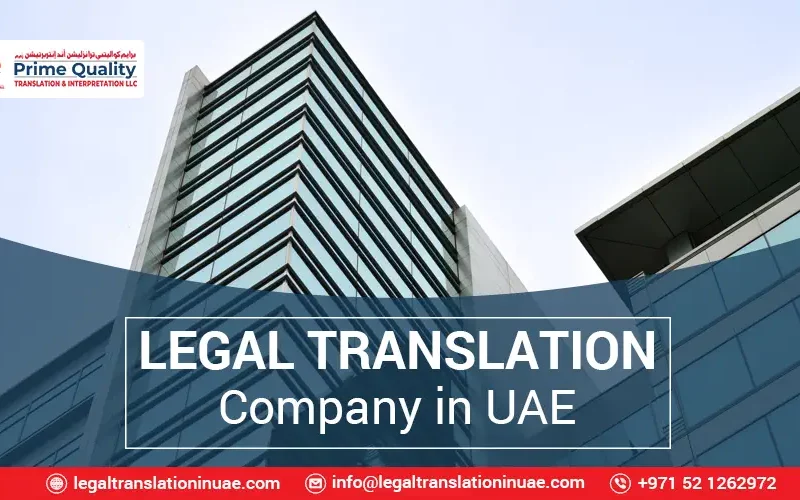
Welcome to our blog article on Prime Quality Translation, the top legal translation company in Dubai! Being a top translation company, we know how crucial trustworthy and precise translation services are to the legal sector. We have made a name for ourselves as the go-to company in Dubai for all translation needs because of our years of expertise and staff of highly talented translators.
Find out why Prime Quality is the best option for translation services in Dubai. Learn about our offerings, knowledge, and dedication to quality!
Understanding the Importance of Legal Translation Company in Dubai
Legal translation is crucial in Dubai's multicultural environment. A professional legal translation company in Dubai is essential to ensure accuracy and bridge linguistic gaps in legal communication, including:
- Contracts
- Court Papers
- Documents
At Prime Quality, our staff of highly qualified translators is dedicated to delivering outstanding services that adhere to the highest standards since we recognize the value of accuracy and knowledge in legal and accurate translation.
Features of Our Legal Translation Company in Dubai
At Prime Quality, we take great satisfaction in the unique qualities that make us stand out as Dubai's best translation company.
1. Professional Linguists
Our highly skilled linguists are knowledgeable in legal jargon.
2. Precise Translation
In every project, we place a high value on accuracy and meticulousness.
3. Assurance of Confidentiality
Client privacy is our priority, as evidenced by our secure systems and confidentiality agreements.
4. Thorough Legal Expertise
Our translators are highly proficient in a wide range of legal systems and jargon, which allows us to handle a wide range of legal documents, such as:
- Contracts
- Court Pleadings
- Intellectual Property Documents
5. Customized Solutions
To ensure accuracy and customer happiness, we provide customized solutions designed to fit their unique needs and expectations.
6. Quick Turnaround
Our quick turnaround times and meticulous attention to detail guarantee that clients receive their translated papers on time without sacrificing quality.
7. Ensuring Quality
Our thorough review procedures provide exceptional precision and expertise.
Put your trust in us for all your translation needs, and see the exceptional qualities we provide.
Role of Our Certified Translators
Trust our certified translators for accurate and reliable translations. With expertise in both target languages and the legal field, we deliver exceptional and trustworthy services that exceed expectations.
Services Offered by Prime Quality Translation
Prime Quality, the top company in Dubai, offers a wide range of services to cater to all your translation needs.
- Marriage Certificate Translation
- Website Localization
- Interpretation Services
- Legal Translation
- Driving License Translation
- Immigration Translation
- Medical Translation
- Document Translation
- Certified Translation
- All Kinds of Language Translation
Rely on our highly skilled translators with expertise across various sectors, ensuring accurate and culturally fitting translations. Our commitment to detail and experience guarantees precise, legally sound translations. Trust us for all your translation needs and experience the excellence of our services firsthand.
Industry Expert
Prime Quality is aware that every legal industry has its jargon and specifications. For this reason, we have a group of translators with specialized knowledge in many legal fields, such as:
- Litigation and Court Documents
- Real Estate Law
- Employment and Labor Law
- Financial and Banking Law
- Healthcare and Medical Law
- International Law
- Legal Sector
- Marketing Sectors
- Corporate Law
- Intellectual Property
Trust us for precise and legally sound translations. Our specialized team ensures accurate and consistent results while preserving the legal integrity of your documents. Rely on our professionals who understand the subtleties of your specific sector.
Ensuring Confidentiality in Legal Translation
Confidentiality is paramount in our legal translations. Prime Quality employs rigorous procedures, including non-disclosure agreements and secure technologies, ensuring the utmost protection for your sensitive information. Trust us for legal translations that meet the strictest secrecy requirements.
Time is Important for Legal Translation Services
Accurate and fast translations are essential in the legal area. Prime Quality places a great value on accuracy and efficiency, guaranteeing the timely delivery of excellent legal translations. You may rely on us to deliver accurate and prompt language solutions, giving you peace of mind throughout your legal pursuits.
The Process of Selecting a Translation Company
Selecting a premier translation company can be a daunting task. Still, with the proper considerations, you can make an informed decision.
- Start by evaluating the company's experience, expertise, and track record in the legal translation industry.
- Look for certifications and accreditations that demonstrate their commitment to quality.
- Consider their range of services and whether they specialize in the legal area you require.
- Confidentiality and data protection should also be a top priority.
- Finally, contact the company and assess their customer support and communication.
Customer Support and Communication
Prime Quality is dedicated to providing the best possible client service and support. Throughout the translation process, our committed staff is here to answer any queries or issues you may have.
Our top priority is effective and timely communication by phone, email, or in-person meetings. You may rely on us to provide exceptional assistance during your translation process.

